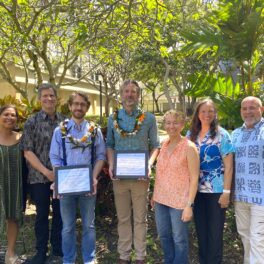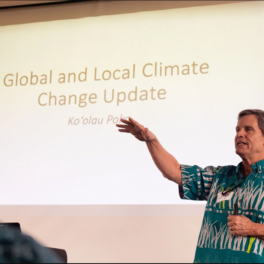$1.25M supports investigation into timing of Earth’s climate change history
 Planktonic foraminifera Orbulina universa. Credit: Dr. Howard Spero, UC Davis.
Planktonic foraminifera Orbulina universa. Credit: Dr. Howard Spero, UC Davis.
Oceanographers Richard Zeebe and Joji Uchikawa were recently awarded four grants from the National Science Foundation totaling nearly $1.25 million to study climate change events in the Earth’s history and to better constrain the timing of these phenomena.
“We aim to develop new high-fidelity dating tools for deep-time sedimentary records and discover potential effects of seawater chemistry changes on abundance and isotope ratios of elements such as lithium and boron in marine carbonate fossils,” said Uchikawa, a researcher in SOEST’s Department of Oceanography.
“The studies will also provide new insight into the chaotic history of our solar system,” said Zeebe, a professor in the same department.
Once the life cycle is over for marine microorganisms such as foraminifera, their central spherical shell made of calcite (CaCO3) is buried in marine sediments. Abundance and isotopic composition of certain elements in the calcitic shells are sensitive to physical and chemical (for example, temperature and pH) condition of seawater at the time of shell formation, providing valuable “time capsules” for researchers to study past changes in the Earth’s climate.
Changes in seawater temperatures for the past 65 million years are derived from stable oxygen isotopes of benthic foraminifera. Dating of these records requires reliable chronology. By studying the patterns of changes in planetary orbits, Zeebe aims to establish an astronomically-tuned chronology extending back to 66 million years ago.
By establishing astronomically-tuned chronology and investigating the controls on chemical and isotopic signatures of carbonate fossils, new research projects by Zeebe and Uchikawa will fine tune the tools to study the history of the Earth’s climate system and global carbon cycling. Understanding the swings and timing of past climate events serves as a foundation for predicting future climate change, particularly, due to greenhouse gas emissions.



